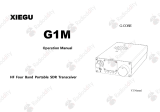Page is loading ...

Installation Sheet 27MAY03 P/N: 3100561 REV: 1.0
Genesis Chime 1 / 2
Genesis Chime
Product information
The Genesis Chime is an audible fire alarm notification
appliance designed for indoor walls. See Table 1 for a list of
model numbers.
The chime includes field configurable jumper options for
selecting the desired dB output, steady or temporal chime
output, and constant non-coded voltage or single-stroke coded
voltage operation. A Genesis Signal Master is required when
chimes are configured for coded operation. See Table 2 for a
list of compatible synchronization modules.
Install this device in accordance with applicable requirements
in the latest editions of the NFPA codes and standards and in
accordance with the local authorities having jurisdiction.
Table 1: Model numbers
Model description Model numbers
Chime,
white
ADTG1-C MG1-C
EG1-C XLSG1-C
G1-C ZG1-C
G1-C-LG
Chime,
white, with FIRE marking
ADTG1F-C MG1F-C
EG1F-C XLSG1F-C
G1F-C ZG1F-C
G1F-C-LG
Chime,
red
ADTG1R-C MG1R-C
EG1R-C XLSG1R-C
G1R-C ZG1R-C
G1R-C-LG
Chime,
red, with FIRE marking
ADTG1RF-C MG1RF-C
EG1RF-C XLSG1RF-C
G1RF-C ZG1RF-C
G1RF-C-LG
Trim plate,
white
ADTG1T MG1T
EG1T XLSG1T
G1T ZG1T
G1T-LG
Table 1: Model numbers
Model description Model numbers
Trim plate,
red
ADTG1RT MG1RT
EG1RT XLSG1RT
G1RT ZG1RT
G1RT-LG
Table 2: Compatible synchronization modules
Model names Model numbers
Auto-Sync Output
Module
SIGA-CC1S SIGA-MCC1S
SIGA-CC1S-LG SIGA-MCC1S-LG
Signal Master
snap-on piggyback
(1-gang)
ADTG1M MG1M
EG1M XLSG1M
G1M ZG1M
G1M-LG
Signal Master - Remote
Mount
ADTG1M-RM MG1M-RM
EG1M-RM XLSG1M-RM
G1M-RM ZG1M-RM
G1M-RM-LG
Note: Synchronization module requirements are determined by
your application
Specifications
Operating voltage
Regulated 16 to 33 Vdc, 16 to 33 Vfwr
This device was tested to the regulated 24 Vdc/fwr
operating voltage limits of 16 V and 33 V. Do not apply
80% and 110% of these values for system operation.
Operating current: See Table 2
Sound level output: See Table 3
Signals
Steady: 60 strokes per minute
Temporal: 3-stroke pattern
Coded: Maximum 60 strokes per minute
Operating modes
Non-coded: Continuous voltage
Coded: Single-stroke controlled by voltage
Default settings
Signal: Steady
Sound level output: High db
Operation: Non-coded
Wire size: 12 to 18 AWG (2.50 to 0.75 sq mm)
Compatible electrical boxes
North American 2-1/2 in (64 mm) deep 1-gang box
Standard 4 in square box 1-1/2 in (38 mm), 2-gang, or 4 in
octagonal with G1T or G1RT trim accessory
Operating temperature range: 32 to 120 °F (0 to 49 °C)
Operating humidity range: 0 to 93% RH
Agency listings: Meets or exceeds UL464 Seventh Edition for
private mode

2 / 2 27MAY03 P/N: 3100561 REV: 1.0
Table 2: Operating current in (Amp RMS)
High db Low db
16 Vdc 0.030 0.019
24 Vdc 0.043 0.026
33 Vdc 0.045 0.027
16 Vfwr 0.060 0.040
24 Vfwr 0.076 0.049
33 Vfwr 0.081 0.055
Vdc = Volts direct current, regulated and filtered
Vfwr = Volts full wave rectified.
Table 3: Sound level output (dBA)
Signal and voltage High db Low db
16 Vdc 56.9 52.5
24 Vdc
59.8
54.8
Temporal
33 Vdc
60.1
55.0
16 Vdc
58.2
52.8
24 Vdc
60.8
55.6
Steady
33 Vdc
61.3
56.1
dBA = Decibels, A-weighted
UL464: Sound level output at 10 ft (3.05 m) measured in a
reverberant room.
Installation instructions
Caution: Electrical supervision requires the wire run to be
broken at each terminal. Do not loop the signaling circuit field
wires around the terminals.
To install the chime:
1. Remove the cover by depressing both tabs on the top of
the unit with a small screwdriver and twisting slightly.
2. Set the chime signal, sound output level, and desired
operation settings. See Figure 1.
3. Connect the chime terminals to the signal circuit field
wiring. You must observe polarity for the unit to function
properly.
For constant non-coded voltage operation, see Figure 2.
For single-stroke coded voltage operation, see Figure 3.
4. Mount the unit onto a compatible electrical box, making
sure not to over tighten the mounting screws.
5. Replace the cover by aligning at the bottom, then
snapping in at the top.
6. Test the unit for proper operation.
Maintenance
This unit is not serviceable or repairable. Should the unit fail to
operate, contact the supplier for replacement.
Perform a visual inspection and an operational test twice a
year or as directed by the local authority having jurisdiction.
J2
J3
J1
To change the chime
from steady to temporal cut
from circle J1 to edge of
circuit board
signal
To change the chime
from non-coded to coded (single-
stroke)
operation
cut from circle J2 to edge
of circuit board
To change the chime
from high dB to
low dB cut J3 trace between
holes
sound
output level
Figure 1: Chime settings
Note: Polarity shown in alarm condition
To next device or
end of line device
-
+
-
+
From compatible fire
alarm control panel
+
-
+
-
Figure 2: Constant non-coded voltage operation
Genesis device with
Genesis Signal Master
[1]
-
+
HS
-
+
To next device or
end of line device
Continuous
power source
Coded power
source
+
+
-
-
+
-
Figure 3: Single-stroke coded voltage operation
/




